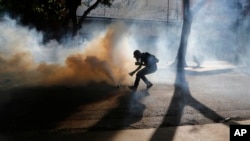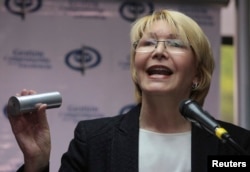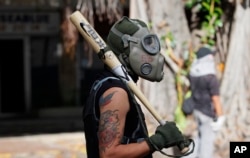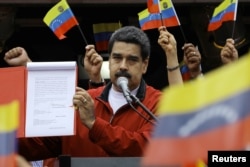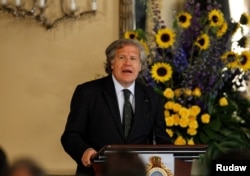Venezuelan security forces are culpable for at least half of the 57 deaths recorded in nearly two months of massive anti-government protests, authorities there say.
Attorney General Luisa Ortega Diaz, speaking at a news conference Wednesday in Caracas, said her office had found the National Guard responsible for last month's death of a 20-year-old demonstrator in Caracas. Juan Pernalete died after he was hit in the chest by a tear gas canister.
Her office issued the report tallying the deaths and injuries to roughly 1,000 others in demonstrations roiling Venezuela almost daily since April 1. At least three of the dead were security troops, the Miami Herald reported.
Ortega reminded security troops that citizens have a right to peacefully protest and that applying excessive force violates internal and international laws. "Use of violence as a political weapon does not contribute to a climate of trust and tranquility in society," she said, underscoring her growing distance from socialist President Nicolas Madura.
Military tribunals called unconstitutional
Ortega also said it was unconstitutional for military tribunals to conduct trials for the civilians it has detained. She announced late Wednesday that her office was opening seven investigations into the detention of anti-government protesters.
The Inter-American Commission on Human Rights earlier this month condemned "the rise in deaths, injuries and mass detentions" accompanying the Venezuelan government's "militarization" in controlling protests. The commission also noted "a series of allegations of torture and ill treatment" of detainees.
Students march
On Thursday, students marched to demand the release of young people, professors and others taken into custody.
In Caracas, Lustay Franco told VOA she was betting that the opposition would bring change in her own and the country's economic prospects, "so that it is possible to survive."
Nicolas Bianco, vice chancellor for the Central University of Venezuela, demanded the release of imprisoned students and teachers.
"We came to support them and to stand side by side for the struggle and freedom of Venezuela," Bianco said. "We are facing a genocidal dictatorship that has systematically murdered young people."
Crimes against people and property have soared as the economy has fallen. Severe shortages of food, medicine and other basic goods in the oil-rich country have fueled a political and economic crisis building for several years. It exploded in late March when the country's Supreme Court tried to strip the opposition-led National Assembly of its legislative powers.
Constitutional assembly plans advance
Meanwhile, Venezuela's political opposition on Wednesday denounced Maduro's plan to forge ahead with a controversial constitutional assembly in late July, contending the foundational document would be rewritten to keep the socialist leader in power.
"We have a constitution that is legally approved, and we have to respect it," said Maria Gracia Clorat, a protester joining in an anti-government march Wednesday in Caracas.
The Maduro administration announced this week that it finally has scheduled regional elections for Dec. 10; they were to have taken place last year.
The president's rivals suspect that the constitutional assembly will represent pro-Maduro interests, and that a revised document might exclude opposition parties and their candidates.
Julio Borges, president of the National Assembly, on Wednesday angrily predicted that the constituent assembly "will not be elected democratically by the people" and would "decide which sector votes, when they vote" and for whom they can vote.
Maduro early this month called for revising the constitution, saying the move was essential to bring peace and prevent his rivals from staging a coup.
Former US diplomat weighs in
A former U.S. State Department official, Roger Noriega, said he was encouraged by the United States' indication it would work with international bodies to help Venezuela address "the causes and roots of the crisis, the regime's mismanagement of the economy in Venezuela, corruption. …"
In an interview Friday with VOA, the former U.S. ambassador to the Organization of American States said he recently has seen better U.S. collaboration with the organization. OAS Secretary Luis Almagro has urged the international community to take more comprehensive measures, including in-country monitoring, to help stabilize Venezuela.
"The United States has recently begun to use the OAS forum to talk about Venezuela," Noriega said. "Before it has only implemented sanctions, talked about democratic values and supported dialogue.
"Now the Trump administration has changed that policy and is strengthening the position of Secretary Almagro to discuss this reality and seek a consensus response."
The VOA Spanish Service's Alvaro Algarra reported from Caracas, Venezuela, with Gioconda Tapia Reynolds contributing from Washington.




